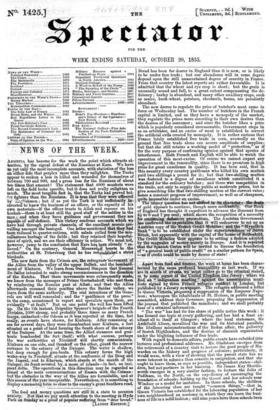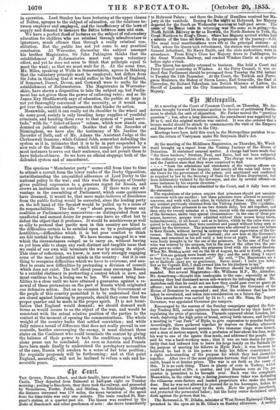• Apart from fond and &ape, the week at home
has been charac- terized bythe same profound tranquillity as last week. If we are in seer& of Ofentp, too 'must either go to the criminal record, or to soino`eopor 61 the United Kingdom like jersey; where we find an " indignation meeting", against the assassination mani- festo signed by three Peen& refugees resident in London, but published by a Jersey newspaper. The refugees addressed a letter to Queen Victoria, proposing a suppression of the Emperor Napo- leon; whereupon the inhabitants of- 8t. Ileliers, in public meeting assembled, addresi their Governor, proposing the suppression of the journal that published the manifesto ; and we shall probably hear of a criminal information.
" The war" has had its due share of public notice this week : it has formed One topic at every gathering, and has had a feast ex- ultant all to itself at Glasgow ; where the local statesman, Sir Archibald Alison, moralized the war and its historical parallels, the libellous misconstructions of the Redan affair, the gallantry of Scotch Plighlanders, and the decline of clannish organization under the blighting infiuence of free trade. With regard to-domestic affairs, public events have subsided into lectures and professional addresses. Mr. Gladstone emerges from the retirement of a country visit to lecture the good people of Ha- warden on the history and progress of colonies ; particularly, it would seem, with a view of showing that the parent state has no more interest in colonies than consists in emigration, and that she ought to leave them, as soon as possible, independent states—chil- dren, but not partners in her business. Sir James Kay Shuttle- worth emerges in a very similar fashion, to lecture the folks of Padiham, in the North, on the expediency of encouraging the foundation of schools • holding up the Queen and her schools near Windsor as a model for imitation. In those schools, the children of the labouring class are taught "common things,"—that is, Queen 'Victoria has established for the labouring population of her Own neighbourhood an academy in which they can learn the busi- ness of life in a solid fashion ; and nine years have these schools been
in operation. Lord Stanley has been lecturing at the upper classes of Bolton, apropos to the subject of educatiop, on the re ations be- tween employer and evaed, and the insufficiency of the laws of supply and demand tO ihe duties betWeen inn and matt.'
We have a perfect flood of lectures on the subject Of reformatory education for children Vim are criminal through Misadventure or ignorance, much oftener than through a really criminal con- stitution. But the public has not yet come to any practical conclusion. At Worcester, discussing the subject amongst his brother Magistrates, Sir john Pakington thinks that the establishment of Reformatories must rest upon voluntary effort, and yet he does not seem to think that principle equal to meet the want; so that we must wait for it. At the same time, Mr. Miles, speaking at Wells in Somersetshire, agrees in thinking That the voluntary principle must be employed; but differs from Sir john in thinking that it would suffice in the South of England, if Somerset, Dorset, Devon, and Cornwall were to unite for the establishment of Reformatories. The Magistrates in Worcester- shire, have shown a disposition to take the subject up, but Parlia- ment has not given them the power of enforcing rates; and as Sir James Kay Shuttleworth says of education, the public at large is not yet thoroughly. convinced of the necessity, or it would soon get over the sectarian embarrassments that hinder its action.
Meanwhile, until it can really set its shoulder to the wheel and do some good, society is only breeding large supplies of youthful criminals, and handing them over to that system of " penal servi- tude," with its " ticket-of-leave" release, which now stands con- demned on judicial authority. Besides that of the Recorder of Birmingham, we have also the testimony of Mr. Jardine the Recorder of Bath, and of Mr. Adams the Assistant Judge at the Clerkenwell Sessions ; while Colonel •Jebb, somewhat defending the system as it is, intimates that it is to be in part suspended by a new rule of the Home Office, which will compel the prisoners in most instances to serve out their sentences, and not permit them to have tickets-of-leave. So we have an official stoppage both of the defended system and of amendment.



































